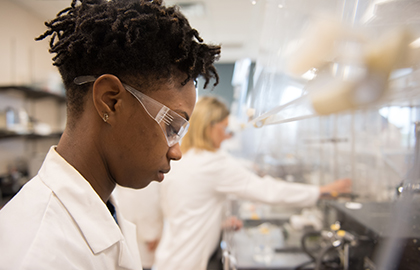
- Augusta University
- Science & Mathematics
- Nuclear Science
Nuclear Science Program
Create Solutions to Help Shape the Future of a Growing Industry
Nuclear Science is a prominent and expanding field, especially in the state and region. The proximity of the Savannah River Site, expanding missions and research opportunities at the Savannah River National Laboratory, the expansion of the Plant Vogtle facility, and the importance of radionuclides in medical physics each represent some of the various rewarding career opportunities for graduates with nuclear science experience.
Nuclear science 4-year degree programs are not common, and graduates will have knowledge and skills to set them apart from others. Nuclear workers have a high-value skill set in an expanding field.
Contact Us
Nuclear Science Program
Health Sciences Campus
Science & Mathematics Building
706-729-2509
What can I do with a Nuclear Science Degree?
Careers
Students that graduate with a nuclear science degree can find themselves in some of the following career opportunities:
- Government Opportunities
- Graduate School
- Nuclear Engineering
- Nuclear Medicine
- Nuclear Power
- Radiation Protection
Where do they go after graduation?
circle icon Employed in Degree Related Area
circle icon Graduate/Professional School
circle icon Military via ROTC
circle icon Other circle icon Unknown
Interests
Successful chemistry and physics majors develop strong problem-solving skills and are interested in learning how the world around them works. Many chemistry and physics majors find great satisfaction with the laboratory work including manipulation of materials and operating analytical instruments. In the nuclear science laboratory, students will gain hands-on experience with a variety of radiation detectors and electronics supporting them.
Start a Reaction
Degree Offerings
The nuclear track is open to both Chemistry and Physics majors. The track consists of 3 nuclear courses as a part of a comprehensive curriculum, with the course title being CHEM or PHYS depending on the major. CHEM3000 or PHYS3000: “Introduction to Nuclear Science”; CHEM 3010 or PHYS3010: “Introduction to Nuclear Measurements”; CHEM 3020 or PHYS3020: “Applications of Nuclear Science”.
A new nuclear science lab has been created which will allow students to gain access and experience with radiation detection and measurements which are applicable to both research and industry endeavors.
Average number of scholarships awarded per semester
Average scholarship awarded per semester
Student internships at SRS with SRNL or SRNS
Hands On Experience
Your Learning Experience
Our goal of incorporating nuclear education into the chemistry and physics degrees that we offer is extremely important to the future needs of our local and national workforces.
Augusta University is one of the few institutions that offers chemistry and physics majors the opportunity to participate in a Nuclear Science track.
Engaged Learning

Undergraduate Research
The Center for Undergraduate Research and Scholarship (CURS) supports faculty-led research and scholarly activity with undergraduates at Augusta University in a variety of ways including:

Assistantships
The department offers many students the opportunity to work as paid assistants in our introductory lab courses. These students work alongside our faculty helping students and preparing labs. In addition, many of our students work as tutors in the department's Student Tutor Center.
Scholarship
Supported by the US Department of Energy
Scholarships of up to $5,000 per semester are available to assist students in completing a Bachelor of Science degree with a demonstrated interest in a career in the nuclear workforce. Students will be accepted on an individual semester basis requiring a resubmission of a renewal application for subsequent semesters. Part-time students may qualify for partial scholarships.
Requirements
- Must be a U.S. citizen.
- Must be a science or math major at Augusta University with a demonstrated interest in exploring the opportunities available in the nuclear workforce.
- Freshman and sophomore students, or other approved students, who have yet to complete the specified introductory courses in their major, should be making appropriate headway in the science and math courses required for their degree. They should also be pursuing appropriate prerequisite courses leading to enrollment in the “Introduction to Nuclear Science” course or an appropriate substitute course.
- Junior and Senior students should have completed the specified introductory course in the major:
-PHYS 2211 for physics
-CHEM 1212 for chemistry
-Appropriate gateway course for other majors
- Must be in good standing with an overall GPA of at least 2.5.
- GPA less than 2.5 may be considered if the applicant has attained a significant academic achievement in the nuclear or a related field.
- Preference will be given to applicants who demonstrate that this scholarship will have a significant impact on the quality of their schoolwork and their ability to complete courses required for a timely progression towards their degree.
Maintaining Scholarship Eligibility
- Scholarship recipients who maintain eligibility must apply for renewed support in subsequent fall and spring semesters.
- Students receiving a full scholarship must make adequate progress towards the completion of their degree by completion of at least 12 hours of required courses each semester. Elective courses do not count towards the 12 hours of progress.
- Students receiving a partial scholarship (for enrollment as a part-time student) must complete the fraction of 12 hours of required courses that matches the fraction of the scholarship. Elective courses do not count towards the progress hours.
- Students must maintain overall grade point average of at least 2.5 and remain in good standing. Students who fall below the minimum GPA for eligibility may apply for the renewal of the scholarship during an additional probationary fall or spring semester. Failure to regain eligibility for the next fall or spring semester after the probationary semester may result in the loss of the scholarship.
Application Process
- Complete the Nuclear Science Scholarship Application form below and include a statement of interest and goals.
- Complete interview with scholarship selection committee.
- Arrange to have two faculty members serve as a reference (at least one from a science
or mathematics instructor familiar with your level of ability). They will receive
a recommendation form by email.
- Email: jnewton3@augusta.edu
- Post: Dr. Joseph Newton, Department of Physics and Biophysics 1120 15th Street SCI-W3005 Augusta, GA 30912
Creating Opportunities
The College of Science and Mathematics provides students with strong foundations in the sciences as well as preparation for careers, citizenship, and a life-long love of learning. We are committed to providing experiences promoting scientific inquiry and discovery and dedicated to creating opportunities for intellectual growth and community involvement.